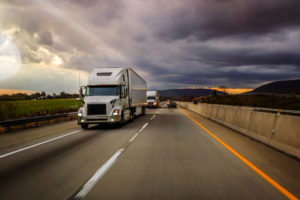By Robert Brown and Ariel Wolf, Times of San Diego
San Diego has a long history in autonomous trucks, dating back to 1991 when Congress authorized demonstration of an automated vehicle and highway system. This $90 million program culminated in a 1997 demonstration on Interstate 15, with 20 automated vehicles, including cars, buses, and trucks driving in “close-headway platoon formation.”
Since then, San Diego’s leadership on autonomous vehicles has only grown, in part thanks to pioneering work at UC San Diego. This includes a recent study by the university’s Autonomous Vehicle Laboratory, led by Dr. Henrik Christensen.
The laboratory conducted the industry’s first environmental fuel study of autonomous trucks in partnership with San Diego’s TuSimple. The study showed that these vehicles are 10% more fuel efficient compared to trucks driven by human drivers.
Unfortunately, California’s leadership position in this technology is in jeopardy. In 2012, the Legislature mandated that Department of Motor Vehicles pass regulations enabling the testing and deployment of autonomous vehicles.
Yet, nearly a decade later, the California DMV has yet to issue those regulations for long-haul autonomous trucks. Despite the state’s aptitude for regulating, its tardiness in addressing autonomous trucks effectively withholds from Californians the benefits and investment that this technology stands to offer.
Autonomous trucking companies are creating thousands of good-paying, full-time jobs in states like Arizona, New Mexico, and Texas. These include technicians, drivers, maintenance workers, mechanics, engineers, software developers, and more.
San Diego-based companies like Qualcomm and TuSimple, as well as other California-based companies like Spartan Radar, Kodiak, Embark and Waymo, are scaling their businesses across the country. Billions in direct economic investment and impact by these companies are flowing to neighboring states, but leaving San Diego and California.
Furthermore, San Diego residents are seeing the impacts of the supply chain crisis at coffee shops and restaurants, grocery stores and car dealerships, plus higher prices for their California burritos, fish tacos, and Ballast Point beer. There are many compounding reasons for the rising inflation, backlogs, shortages and delays, but there’s a notable long-term problem: the truck driver shortage.
Even before the pandemic, the trucking industry was short 60,000 drivers, and industry trends indicate the shortfall could nearly triple by 2030. Drivers themselves point to long hours on the road and weeks away from family as top reasons why new hires and veterans are leaving the industry.
California policymakers have proposed many plans to boost the state’s supply chain, but without truly addressing the long-term driver shortage. To set California up for long-term success, Gov. Gavin Newsom’s administration should direct the DMV to commence a rulemaking for autonomous trucks to safely test and deploy.
Misinformation on the potential negative workforce impacts has been dispelled and can no longer cause politicians to be skittish on this issue. In reality autonomous trucks will complement truck drivers and create good, high paying jobs.
A study from the U.S. Department of Transportation confirmed that autonomous trucks can create up to 35,100 new jobs per year across the economy — without layoffs. Truck jobs are not going away due to the lasting shortage and turnover. Autonomous trucks can fill in the gaps, while improving efficiencies and opportunities for California businesses, farms and consumers.
The Transportation Department study also projected that allowing autonomous trucks will raise American workers’ wages overall and encourage $111 billion in investment. With delivery optimization, local restaurants and stores can count on receiving goods when they’re expected, and businesses can ship goods to customers more efficiently.
There are also critical safety benefits from autonomous trucks. The latest data from the National Highway Traffic Safety Administration shows that 32,000 people died on U.S. roads in the first nine months of last year — with approximately 10% of fatalities occurring in California. Tragically, trucks are often a factor in crashes. Nearly 14% involve a truck, and one in three long-haul drivers will be part of a serious crash during their career.
In light of the benefits promised by autonomous trucks, it’s time for the DMV to set rules and allow testing in California. A group of autonomous truck developers, freight carriers, shippers, and equipment manufacturers have formed the California Alliance for Freight Innovation to urge the Newsom administration to take action.
California stands to reap the environmental benefits, economic opportunities, jobs, and greater supply chain efficiencies of autonomous trucks. Policymakers must move forward on the needed regulations for the safe and swift deployment of autonomous trucks.
Robert Brown is chief strategy officer for Spartan Radar and a founding member of the California Alliance for Freight Innovation. Ariel Wolf is with the California Alliance for Freight Innovation.

